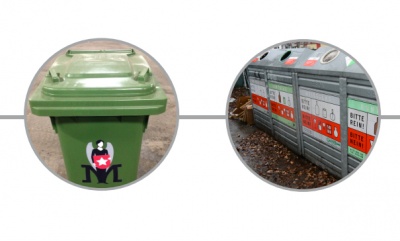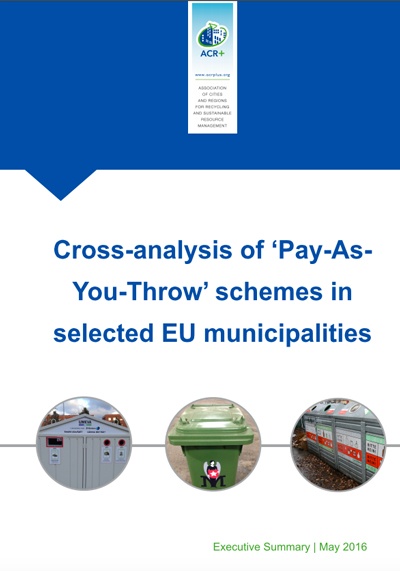PAYT can ‘greatly increase recycling’
Pay-as-you-throw (PAYT) systems can greatly increase recycling and home composting while reducing residual waste and providing a well-received service to residents, according to new analysis carried out by ACR+ (the Association of Cities and Regions for Recycling and sustainable Resource management).
In the report, 'Cross-analysis of "Pay-As-You-Throw" schemes in selected EU municipalities', ACR+, an international network predominantly comprising local and regional authorities with ‘the common aim of promoting smart resource consumption and waste management’ examines the cases of seven municipalities across Europe to clarify the potential benefits and challenges when introducing PAYT to household waste collections. The report also states that there is no one successful approach to the system, with different successful schemes varying greatly in detail, coverage, objectives, measures and policy instruments.
 Indeed, the report concludes that a single policy measure can rarely achieve the desired policy goals, and that policy measures have the best results when they are applied in a mix. It states that PAYT should always be ‘incorporated into a mix of environmental policy measures such as prevention/recycling targets, extended producer responsibility (EPR), bans/taxes and public information campaigns’.
Indeed, the report concludes that a single policy measure can rarely achieve the desired policy goals, and that policy measures have the best results when they are applied in a mix. It states that PAYT should always be ‘incorporated into a mix of environmental policy measures such as prevention/recycling targets, extended producer responsibility (EPR), bans/taxes and public information campaigns’.
The systems examined in the study were Interza (Belgium), Maastricht (the Netherlands), Umeå (Sweden), Zollernalbkreis (Germany), Treviso (Italy), Besançon (France) and Innsbruck (Austria).
Fee structure
The design of the fee structure, or mix of fixed and variable fees, is critical to fully incentivise changes in waste behaviour, the report states.
It continues that for a PAYT system to reach its potential, the fee structure should ‘correctly reflect the costs of the waste services for the municipality’, while also holding the proper balance of fixed and variable parts to encourage reductions. This means the municipalities need to have a solid understanding of the costs involved in their waste collection infrastructure.
The analysis of the seven case studies concluded that PAYT schemes are most effective when the fees imposed on households are at levels high enough to encourage reflection by householders on their waste generation behaviour. However, it warns that charges should not be made so high that they provide a strong incentive for fly-tipping.
Types of PAYT system
Looking at the variety of methods of how the fee is calculated, the study found that weight-based systems were the most successful at bringing about residual waste reduction, followed by combined volume and frequency-based/sack-based systems, and then volume-based systems, for example schemes where households simply choose a specific size of container or bag (a method used in South Korea, covered in Resource 82).
Additionally, the largest reductions in waste appear to come from the diversion of food waste, meaning particular care should be paid to designing this part of the system.
Regarding resident approval of PAYT systems, general waste surveys carried out by the municipalities show overall satisfaction with such systems, and waste planners reported to ACR+ researchers that users have a ‘perceived high level of acceptance’ for the waste services and billing system.
The general advantages for the policy listed by the municipalities are that it is ‘fair’, offers a strong incentive for waste reductions and increased sorting, and that it delivers high-quality waste data.
During the initial roll-out phases, when users are adjusting to the fee, the study found that to ensure a smooth process municipalities should stay in close contact with residents through educational materials, and carefully monitor waste outcomes and revenue to adjust the fee accordingly.
 The front page of the 'Cross-analysis of "Pay-As-You-Throw" schemes in selected EU municipalities' report
Barriers
The front page of the 'Cross-analysis of "Pay-As-You-Throw" schemes in selected EU municipalities' report
Barriers

Potential barriers to successful PAYT schemes identified in the report include a lack of diversion goals, lack of corresponding recycling infrastructure expansions, limited outreach to customers about how to change purchasing habits, and charging of a separate fee for recycling.
In a related development in Ireland, the nationwide ‘Pay By Weight’ system due to begin in July this year initially included a charge for recycling (around 1.5p per kilogramme, compared to 8.5p for residual waste and 4.5p for garden waste). However, after opposition from a number of groups that suggested enforced charging for recycling was counter-intuitive, this fee was last week removed from the system. Local authorities within Ireland will still be able to impose a recycling charge should they so wish.
Schemes ‘increase resource efficiency and boost circular economy’
Launching the report, Françoise Bonnet, ACR+ Secretary General, said: “PAYT is one of the economic instruments that local authorities can implement on their territories in order to increase their resource efficiency and boost [the] circular economy.
“The Circular Economy Package published by the European Commission in December 2015 clearly mentioned the insufficient use of economic instruments like PAYT schemes which contribute to the achievement of high recycling rates, and as such invites member states to make better use of them. We hope that this report will inspire local authorities in Europe.”
The ACR+ report into pay-as-you-throw systems can be downloaded from the body’s website.






